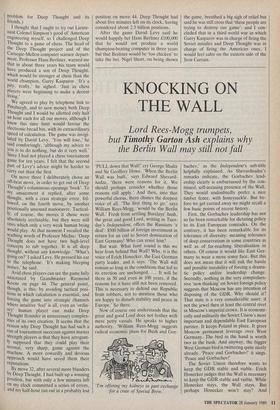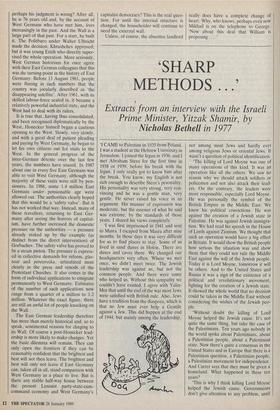KNOCKING ON THE WALL
Lord Rees-Mogg trumpets,
but Timothy Garton Ash explains why
the Berlin Wall may still not fall
TULL down that Wall!' cry George Shultz and Sir Geoffrey Howe. 'When the Berlin Wall was built,' says Edward Shevard- nadze, 'there were reasons for it. We should perhaps consider whether those reasons still apply.' And then, into that powerful chorus, there chimes the deepest voice of all. 'The first thing to go,' says William Rees-Mogg, 'would be the Berlin Wall.' Fresh from settling Barclays' hash, the great and good Lord, writing in Tues- day's Independent, offers the Russians `a deal': $500 billion of foreign investment in return for an end to Soviet domination of East Germany! Who can resist him?
But wait. What faint sound is this we hear from behind that Wall? Why, it is the voice of Erich Honecker, the East German party leader, and it says: `The Wall will remain so long as the conditions that led to its erection are unchanged. ... It will be there in 50 and even in 100 years, if the reasons for it have still not been removed. This is necessary to defend our Republic from robbers, not to mention those who are happy to disturb stability and peace in Europe.' So there.
Now of course one understands that the great and good Lord does not bother with mere petty vassals. He speaks to higher authority. 'William Rees-Mogg suggests radical economic plans for Bush and Gor- 'I'm offering my kidneys in part exchange for a crate of Special Brew.' bachev,' as the Independent's sub-title helpfully explained. As Shevardnadze's remarks indicate, the Gorbachev lead- ership clearly is embarrassed by the con- tinued, self-accusing presence of the Wall. They would undoubtedly prefer a nice timber fence, with honeysuckle. But be- fore we get carried away we might recall a few basic points of recent history.
First, the Gorbachev leadership has not so far been remarkable for dictating policy to its East European comrades. On the contrary, it has been remarkable for its tolerance of diversity: meaning tolerance of deep conservatism in some countries as well as of far-reaching liberalisation in others. Of course it would like East Ger- many to wear a more sonsy face. But this does not mean that it will risk the hassle and possible instability of forcing a drama- tic policy and/or leadership change. Secondly, nothing in the very comprehen- sive `new thinking' on Soviet foreign policy suggests that Moscow has any intention of disposing of the GDR. Why should it? That state is a very considerable asset: if not the jewel then at least the central rivet in Moscow's imperial crown. It is economi- cally and militarily the Soviet Union's most important and dependable East European partner. It keeps Poland in place. It gives Moscow permanent leverage over West Germany. The bird in the hand is worth two in the bush. And anyway, the bigger West German bird is twittering quite nicely already. 'Peace and Gorbachev!' it sings. `Peace and Gorbachev!'
The Soviet Union therefore wants to keep the GDR stable and viable. Erich Honecker judges that the Wall is necessary to keep the GDR stable and viable. While Honecker stays, the Wall stays. But perhaps Honecker won't stay? And
perhaps his judgment is wrong? After all, he is 76 years old and, by the account of West Germans who have met him, lives increasingly in the past. And the Wall is a large part of that past. For a start, he built it. The Politburo under Walter Ulbricht made the decision; Khrushchev approved; but it was young Erich who directly super- vised the whole operation. More seriously, West German historians fOr once agree with' their East German colleagues that this was the turning-point in the history of East Germany. Before 13 August 1961, people were fleeing in such numbers that the country was jocularly described as 'the disappearing satellite'. After 1961, with its skilled labour-force sealed in, it became a relatively powerful industrial state, and the West had to deal with its rulers.
It is true that, having thus consolidated, and been recognised diplomatically by the West, Honecker himself began a cautious opening to the West. Slowly, very slowly, and with a great deal of patient pleading and paying by West Germany, he began to let his own citizens out for visits to the West. In the general progress of the inter-German detente over the last few years, the numbers have soared. In 1987 about one in every five East Germans was able to visit West Germany, although the majority of these visits were still by pen- sioners. In 1988, some 1.4 million East Germans under pensionable age were allowed out. The authorities clearly hoped that this would be a `safety valve'. But it has not worked that way. Instead, many of these travellers, returning to East Ger- many after seeing the horrors of capital- ism, have further increased the domestic' pressure on the authorities — a pressure already stoked up by the example (as distinct from the direct intervention) of Gorbachev. The safety valve has proved to be a steam piston. The pressure is express- ed in collective demands for reform, glas- nost and perestroika, articulated most clearly in the press and synods of the Protestant Churches. It also comes in the form of individual applications to emigrate permanently to West Germany. Estimates of the number of such applications now range from a quarter of a million to 1.2 million. Whatever the exact figure, there are still an awful lot of people knocking on the Wall.
The East German leadership therefore has more than merely historical and, so to speak, sentimental reasons for clinging to its Wall. Of course a post-Honecker lead- ership is more likely to make changes. Yet the basic dilemma will remain. They can only open the frontiers if they can be reasonably confident that the brightest and best will not then leave. The brightest and best will only not leave if East Germany can, taken all in all, stand comparison with West Germany as a place to live. But is there any stable half-way house between the present Leninist party-state-cum- command economy and West Germany's capitalist democracy? This is the real ques- tion. For until the internal structure is changed, the householder will continue to need the external wall.
Unless, of course, the absentee landlord really does have a complete change of heart. Why, who knows, perhaps even now Mikhail is on the telephone to George. `Now about this deal that William is proposing ....'


















































 Previous page
Previous page